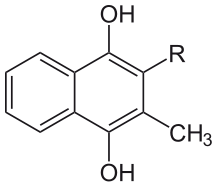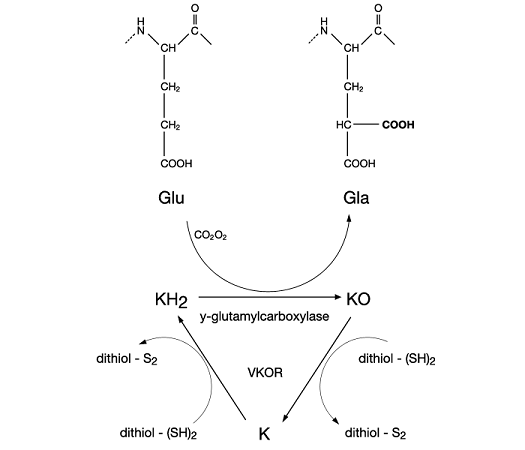This is part 3 of Vitamin Wednesday, my attempt of making sense of all the vitamins out there. First I will look at what vitamin K is and then write about its health benefits. And of course, I will share my opinion. Like in all my posts I will base my argument on scientific literature (expect many in-text citations).
Previous posts in this series:
What Is Vitamin K
Vitamin K is a family of related vitamins. This family can be separated into phylloquinones and menaquinones (1). The main dietary form of vitamin K are the phylloquinones, which can be found in leafy greens (2). Found in small quanities in dairy products and meat products are the menaquinones, which are mainly produced by bacteria (for example your gut-bacteria) (3), (4). It seems that the contribution of gut bacteria is significant to fulfill the dietary need for vitamin K (5). It has been shown that dairy products contain appreciable amounts of multiple forms of vitamin K (6). Vitamin K is very rare as our nutrition, our gut microbiome and metabolic mechanisms ensure adequate levels of vitamin K (7).

Chemically-speaking, vitamin K is a lipid soluble polycyclic aromatic ketone (8). This means that "R" in the picture, is usually a longer unsaturated hydrocarbon chain. Since it is lipophilic, vitamin K is non-soluble in water and thus fat is needed to absorb vitamin K into your body. Just like vitamin A, vitamin K forms mixed micelles in the duodenum (9). Enterocytes then absorb these mixed micelles into the blood stream (10). In the blood vitamin K is bound inside chylomicrons, secreted into the lymphatic capillaries, transported to the liver, and repackaged into very low-density lipoproteins (3), (11). Vitamin K can be stored in the liver or, due to its lipophilicity, in fat tissue (7). There is a vitamin K metabolism through which Vitamin K is recycled. This process is called the vitamin K oxidation-reduction cycle, which is executed and regulated by several enzymes that activate and later deactivate vitamin K (12).

Vitamin K And Health
Like many vitamins, vitamin K´s main use in the body is as a cofactor. Co-factors are not enzymes, but they are required by certain enzymes to function properly (13). Vitamin K plays an important role in blood clotting. Certain glutamic acid residues in specifc proteins, so called clotting factors, are carboxylated by vitamin K, enabling those proteins to bind calcium ions (14). The effects of vitamin K deficiency can be seen in babies. In vitamin K deficienty babies, bleeding is common and can be fatal (15). Thus the American Academy of Pediatrics Committee on Fetus and Newborn recommends a single, intramuscular dose of 0.5 to 1 milligram after birth (16). Critics claimed that there is a correlation between the intramuscular vitamin K short and cancer, something that has been disproven in a large study (17).
Osteoporosis is characterized by low bone-density and can usually be prevented by consuming sufficient calcium and vitamin D (18). The role of vitamin K in bone health has not been as well understood as its role in blood clotting, but research efforts yielded some results. A study states that vitamin K has positive effects on bone density in people affected by osteoporis (19). It seems that vitamin K and vitamin D work in a synergistic way (19). The current theory is that vitamin K performs a similar task as it does as blood clotting co-factor: carboylation of certain amino acid residues in calcium-binding enzymes (in this case osteocalcin) (20). The European Food Safety Authority allows the healthclaim that dietary intake of vitamin K is important for the maintenance of normal bone (21).
A new area of research is a possible link between vitamin K and decreased risk for coronary heart disease. However, it seems like this area is relatively new and that results from studies have not yet shown that vitamin K may prevent cardiovascular disease (3). There have not been reported any toxic effects of vitamin K, however, there are dangerous interactions with anticoagulants (3).
My Opinion
To be honest, the most interesting part of writing this series is not the vitamins. I mean, I learned in my biochemistry classes that vitamins are co-factors (enzymes are the real stars of the show), which are needed to keep our body running. The cool thing is to see how much research is being done. It is very encouraging to see how many people are working in research and how much knowledge we are generating each and every day.
Anyways, this is probably the first time that there was no official upper limit for a nutrient. However, I am 100% convinced that you can do harm to yourself if you consume too much vitamin K. Also, it seems unlikely that, unless you are a new-born (congrats that you can log onto the internet and read a blog post as a new born), you will not have a vitamin K deficiency. So save yourself the money to buy supplements (unless you actually need them - ask your doctor).

Shameless Self-Advertisement
Thank you very much for your undivided attention. I hope you enjoyed this post. As you probably guessed, these posts do take a lot of time and effort. However, I am not perfect so if I forgot something please let me know and I will correct any mistakes or shortcomings. If you liked this post, you may like some of my other ones. Please feel free to check out my blog. Do not forget to upvote and resteem if you liked this post.
As always,
Cheers @lesshorrible!
This is a test comment, notify @kryzsec on discord if there are any errors please.
Being A SteemStem Member
Downvoting a post can decrease pending rewards and make it less visible. Common reasons:
Submit
Hey @lesshorrible! You did some great research for this one. Some great information is contained in this post!
Downvoting a post can decrease pending rewards and make it less visible. Common reasons:
Submit
Thanks buddy! I checked your post and I think you will make some quality contributions to SteemSTEM! I hope you get discovered. Keep up the good work! Also, maybe try to find a style guide and work a bit on your design (it is very rewarding to finish a post that is informative and also looks good haha!) Cheers!
Downvoting a post can decrease pending rewards and make it less visible. Common reasons:
Submit
very helpful post.
Upvote and resteem.
Downvoting a post can decrease pending rewards and make it less visible. Common reasons:
Submit
Thank you @salma-akanda!
Downvoting a post can decrease pending rewards and make it less visible. Common reasons:
Submit
@lesshorrible what are your thoughts on the newborn Vitamin K shot vs oral Vitamin K?
Downvoting a post can decrease pending rewards and make it less visible. Common reasons:
Submit
Hey since I did not research that topic I cannot give you an answer. Injections are a hot topic these days (for whatever reason) and I do not want to make statements without researching the topic first. Sorry. But you are welcome to share your opinion (but please base it on research). Cheers!
Downvoting a post can decrease pending rewards and make it less visible. Common reasons:
Submit
Congratulations. This post is featured in this week's nunesso's Curation post for the Nutrition and Natural Products industry. You have received a 100% upvote from us.
https://steemit.com/natural-products/@nunesso/weekly-nunesso-natural-products-curation-5
Downvoting a post can decrease pending rewards and make it less visible. Common reasons:
Submit